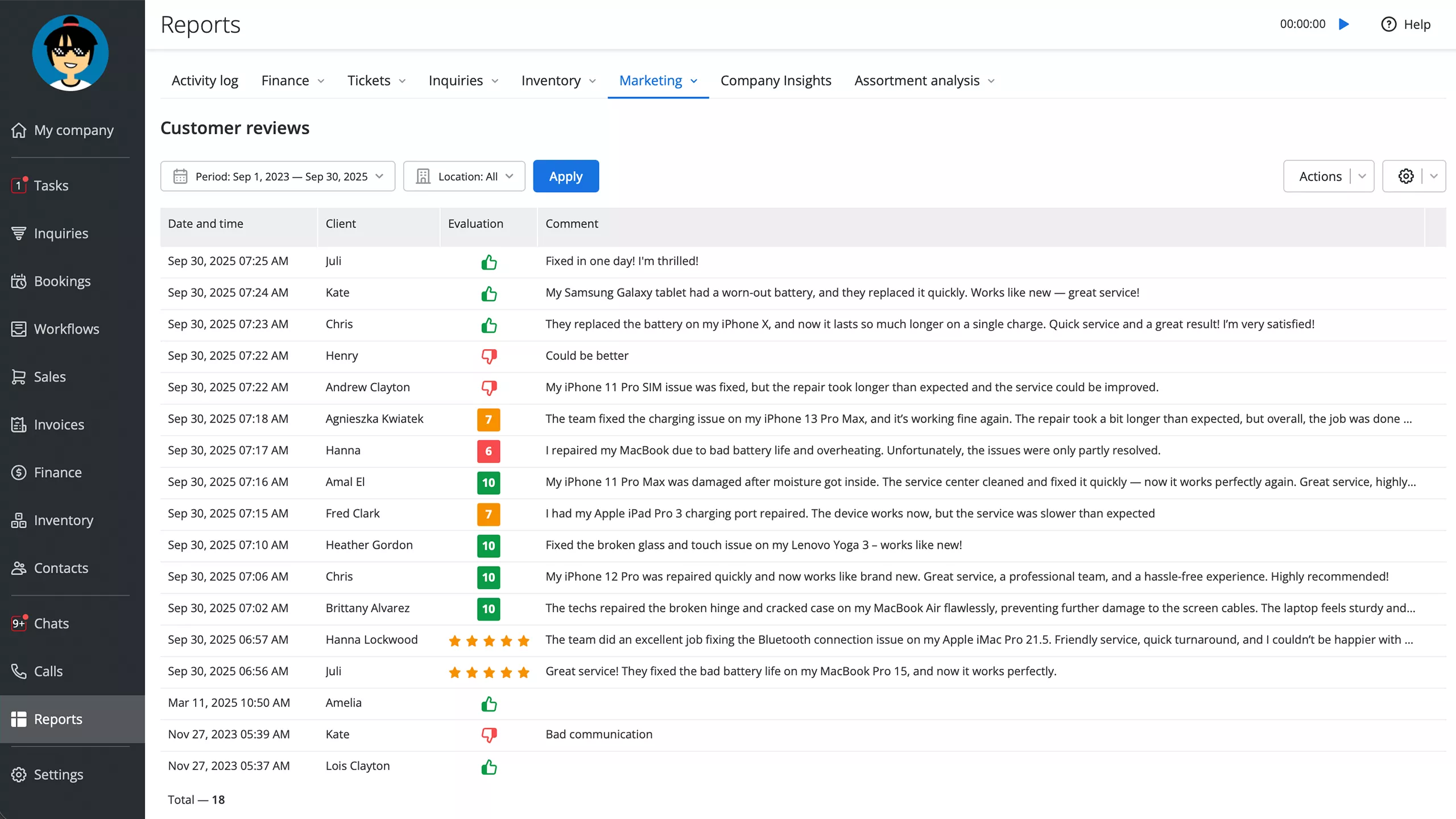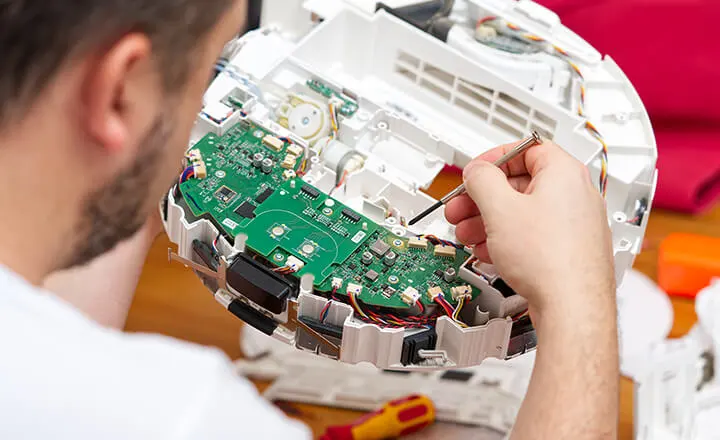How To Start A Small Engine Repair Business
Want to start a small engine repair business? Explore our step-by-step guide for valuable insights and practical advice to help you succeed in the repair industry.
Table of Contents
Is Small Engine Repair Profitable?
Small Engine Repair Shop Owner's Salary
How Much Does It Cost to Start a Small Engine Repair Shop?
Is Repair Shop Management Solution Worth It for New Businesses?
What do I Need to Start a Small Engine Repair Business?
Final Thoughts
You may have been repairing lawnmowers and motorcycles as a hobby for years, and now you're wondering if you could turn your passion into a profitable business. Starting a small engine repair shop can be lucrative, especially in areas with a demand for such services. With the right skills, tools, and marketing strategies, you can transition from a hobbyist to a successful entrepreneur in small engine repair. This blog post will cover everything you need to know to turn your passion for fixing small engines into a thriving business.
Is Small Engine Repair Profitable?
If you’re wondering “Is small engine repair a good business?”, look at this niche market's increasing demand. Many consumers rely on small engines for lawn care, recreational vehicles, and other outdoor equipment, leading to a consistent need for maintenance and repair. Starting a small engine repair business typically requires a relatively low initial investment, making it a cost-effective venture. You can run a small engine business from a small shop or even a home garage with minimal equipment.
However, profitability greatly depends on pricing strategy, competition, skill level, and customer loyalty. By providing high-quality service and building a strong reputation, a small engine repair business can establish a loyal customer base and achieve long-term success.
Start your small engine repair business on the right foot — automate routine tasks with Orderry from day one
Small Engine Repair Shop Owner's Salary
The salary of a small engine repair shop owner in the U.S. can vary widely based on factors such as location, experience, and business size. On average, you can expect to earn between $40,000 and $80,000 annually. In more prosperous areas or for those who have successfully established a strong customer base and reputation, earnings can reach upwards of $100,000. However, many owners also face challenges that can affect their income, including competition, fluctuating demand for services, and the costs associated with maintaining and operating their shop. As a result, the income potential can be quite variable.

How Much Does It Cost to Start a Small Engine Repair Shop?
The startup costs can vary depending on factors such as location, size, and the services offered. Typically, you can expect initial expenses to range from $10,000 to $50,000, which includes:
- Tools and equipment, such as wrenches, diagnostic tools, and specialty machines, can range from a few hundred to several thousand dollars
- Costs for renting or leasing a workshop space, which may include utilities and maintenance fees, depend on the location and size of the facility
- Licensing and insurance fees are necessary to comply with local regulations and protect the business from liabilities, adding to the overall startup costs
- Inventory purchases, including replacement parts and supplies, are crucial to ensure a steady workflow and can vary based on the types of engines serviced
In addition, there may be costs associated with hiring and training employees, setting up accounting systems, and investing in small engine repair software. It is essential to carefully plan and budget for these startup costs to ensure the success and sustainability of the small engine repair business.
Pro Tip: Starting a small engine repair business from home can save you money on the rent. Set up a dedicated workspace with the necessary repair tools and equipment while ensuring small engine repairs at your home comply with local zoning regulations. Invest in marketing efforts such as social media advertising, a simple website, and flyers in your community to attract clients.
Is a Repair Shop Management Solution Worth It for New Businesses?
Having repair ticket software when starting your repair shop can significantly streamline your operations and improve efficiency. Here are a few reasons why it's beneficial:
- Digital solutions like Orderry help you keep track of customer information, service history, and inventory in an organized manner. This ensures you don’t lose important data and can easily reference it when needed.
- With job scheduling features, you can easily manage appointments and service timelines, allowing you to allocate your time effectively. This minimizes downtime and enhances customer satisfaction.
- Business management tools often include invoicing capabilities, making it easier to bill customers and keep track of payments. This can improve cash flow and simplify financial management.
- Digitalizing your inventory helps track parts and tools, notify you when supplies run low, and streamline the reordering process, ensuring you always have what you need.
- Many solutions provide insights and reports with Business Dashboard on sales, customer preferences, and service trends. This information can help you make data-driven decisions to grow your business.
- With reminders and follow-up features, you can manage customer communications hassle-free, leading to improved relationships and repeat business.
- Using modern technology lends a professional touch to your services, helping you stand out from competitors who may be relying on outdated methods.
Investing in small engine repair shop software early on establishes a solid foundation for your business, making it easier to scale and adapt as you grow.
 Processing small engine repairs in Orderry
Processing small engine repairs in Orderry
Start managing your small engine repair shop hassle-free!
Sign up for a 7-day free trial of Orderry today.
What do I Need to Start a Small Engine Repair Business?
Whether you dream of a home-based handyman small engine repair or a bustling workshop, understanding what you'll need to succeed is crucial. Let’s explore the key components:
1. Assess Your Skills and Knowledge
To start a small engine repair business, you need a combination of technical skills, business acumen, and customer service knowledge. First and foremost, a strong foundation in mechanical skills is essential, including the ability to diagnose and repair various small engines, such as those found in lawnmowers, chainsaws, and motorcycles. Consider taking a course to bolster your understanding of engine components, repairs, and maintenance techniques. There are many online and community college courses available that can provide valuable information and certifications.
Business knowledge, including financial management, pricing strategies, and marketing, will help you effectively manage your operations and attract customers. Strong communication skills are also vital for providing excellent customer service, building rapport with clients, and explaining technical issues easily.
2. Create a Business Plan
A well-thought-out business plan will help you stay focused and organized as you launch your small engine repair business. Your plan should include:
- Business objectives. Define what you hope to achieve with your business.
- Target market. Identify your potential customers (e.g., homeowners, landscapers, etc.).
- Services offered. Decide what services you will provide, such as regular maintenance, repairs, or custom modifications.
- Financial projections. Estimate start-up costs, pricing strategies, and projected earnings.
- Progress tracking. Set goals and milestones to track your progress, ensuring your plan is a living document that you can adapt as your business evolves.
Pro Tip: Set prices based on the perceived value of your services to customers rather than simply covering your costs or following competitors' pricing. By highlighting the unique benefits and quality of your repair services, you can justify charging higher prices to customers who value the expertise and quality you provide.

3. Choose a Business Structure
Will you operate as a sole proprietorship, LLC, or corporation? Each structure has different tax implications and liability protections. However, the best business structure for a small engine repair business is often a limited liability company (LLC). It provides flexibility and protection of personal assets from business liabilities, which is particularly important in a hands-on industry where accidents or equipment failure could lead to legal issues. An LLC also offers favorable tax treatment options, as profits can be passed directly to the owner without facing double taxation. This simplicity of management and reduced regulatory burdens compared to corporations make an LLC an appealing choice for small business owners looking to focus on operations rather than complex compliance matters.
4. Obtain Necessary Licenses and Permits
Whether you need a small engine repair license to start your own business depends on the regulations in your specific state or locality. Many areas require a business license, and licensing for small engine repair may be necessary to ensure that you meet safety and environmental standards. Check with your local government or regulatory agency to understand the specific requirements. Additionally, obtaining relevant certifications can enhance your credibility and demonstrate your expertise to customers, even if not legally required. Ultimately, ensuring compliance with applicable regulations is crucial for the long-term success of your small engine repair business.
5. Set Up Your Workshop
Find a suitable location for your repair shop. It could be a leased space, a garage at home, or even a mobile setup if you prefer to operate on-site. Ensure the location is equipped with the essential small engine repair tools, such as:
- Engine diagnostic tools
- Hand tools (wrenches, screwdrivers, pliers)
- Power tools (drills, saws)
- Safety gear (gloves, goggles)
Next, create a small engine repair shop layout to organize your workspace efficiently. Use vertical storage solutions, such as shelves and pegboards, to keep tools off the workbench and within easy reach. Designate specific areas for different tasks — like disassembly, cleaning, and assembly — to streamline processes and minimize movement. Investing in storage bins or toolboxes for small parts can enhance organization, ensuring that everything has a designated home. Additionally, consider implementing a labeling system to quickly identify where items are stored, saving time and improving overall productivity in the shop.
Discover more effective inventory management techniques for small businesses

6. Develop a Marketing Strategy
To attract customers, you’ll need an effective marketing strategy. Use a combination of online and offline methods to promote your business, including:
- Website. Showcase your services, pricing, and customer testimonials
- Social media presence. Share tips, and before-and-after photos of repairs, and engage with your community
- Networking. Attend local trade shows, farmers markets, and community events to promote your services
- Customer referrals. Offer discounts or incentives to clients who refer new customers to you
Need more ideas on how to attract clients without spending a fortune on marketing? Learn more about Google Reviews Automation
7. Stay Updated on Industry Trends
The small engine repair industry is constantly evolving, with new technologies and engines regularly entering the market. Stay informed on trends through workshops, online forums, trade publications, and by joining relevant associations. Continuous learning will help you stay competitive in your field.
Pro Tip: As for now, there is a growing trend towards environmentally friendly practices and technology. More and more consumers are looking for eco-friendly options, increasing the demand for electric and hybrid small engines. Clients are also more interested in preventative maintenance to prolong the lifespan of small engines rather than waiting for them to break down.
8. Focus on Quality and Reputation
Building a good reputation when running a small engine repair shop involves a combination of excellent customer service, high-quality workmanship, and effective marketing strategies. Here are some of the best practices you can try:
- Prioritize clear and honest communication with your customers, ensuring they feel valued and informed throughout the repair process
- Consistently delivering reliable repairs and maintaining transparency regarding costs in estimates and quotes will foster trust and encourage repeat business
- Actively seek out customer feedback and reviews, using them to improve your services and showcase positive experiences to potential clients
- Engaging with your local community through events or partnerships can further enhance your visibility and credibility
- Leveraging social media to share success stories, tips, and promotions helps you connect with a broader audience, while word-of-mouth referrals can significantly contribute to building a strong reputation over time
 Collecting customer feedback in Orderry
Collecting customer feedback in Orderry
Final Thoughts
Starting a small engine repair business can be a fulfilling venture for those with an interest in mechanics and repair. By following these steps and dedicating yourself to quality service and continuous learning, you can build a successful and sustainable business. So roll up your sleeves, put on your tool belt, and get ready to turn your passion for engines into a profitable enterprise.



